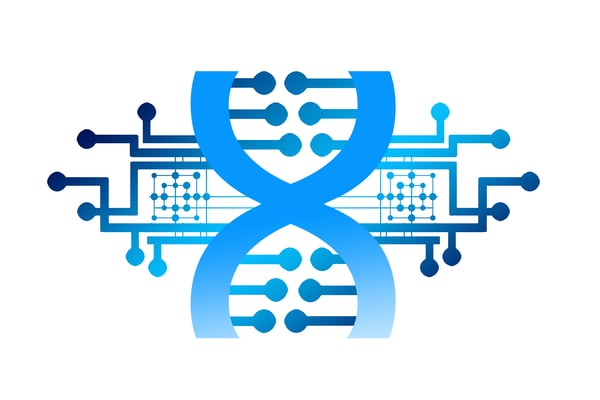-The MetaOptima Team
Would you like to remain connected with your patients & colleagues while providing streamlined care and receiving a new source of income? sign up for a demo today!
The Complementing Nature Of AI In Dermatology
Artificial intelligence (AI) refers to the capacity of machines to think, reason and perform cognitive processes much like any average human being does.1 Despite the relative delayed adoption of AI in healthcare environments, machines are already making their way into hospital and clinics, including dermatology practices. However, the changes introduced by this new technology are raising various degrees of opposition in the field.2 This article will consider the utility of deep learning technologies in dermatology software and their complementing nature to ongoing patient-doctor relationships.
1. What are the driving forces behind dermatology AI applications?
The development of the technology behind the power exhibited by machines is inherently human, and much as humans learn, so do machines. Basic training techniques are founded on exposure to information sources, data recognition and memorizing. Dermatology AI algorithms have recently shown how machines trained on thousands of previously identified skin lesions are able to outperform a panel of experienced dermatologists identifying and classifying such conditions.3
Indeed, the technology supporting such developments is comprised of two complex programming functionalities known as convolutional neural networks (CNN) for content-based image retrieval (CBIR). Beyond their relative technical complexity, CNN emulates the thinking process occuring in human brain cells connections, allowing to create association patterns that lead to learning through reasoning and memorization.4 Similarly, the outstanding searching and comparing capabilities of AI-powered software relies on CBIR. A process enabling machines to contrast similarities and differences of a target skin lesion image against large databases of pre-labelled classified content.
AI-powered dermatology systems such as DermEngine offer such capabilities through tools like Visual Search. Combined, both these technologies give machines the potential to solve diagnosis problems with a level of accuracy and readiness difficult to match by any human being. Ironically, the same nature that makes humans capable to design and create such technology is what also makes them incredibly complex in many other areas, particularly emotional and relationally. Machines, in contrast, only work for what they’ve been trained and at times are able to exceed the capacities of their creators in individual tasks. However, can machines ever reach the emotional complexity involved in human interactions?
 2. Is there room for anyone else in patient-doctor relationships?
2. Is there room for anyone else in patient-doctor relationships?
Although the degree of penetration for machines in the healthcare realm has come at a later time than other fields, it has reached unpredicted levels fairly rapidly.5 However, given the traditional relational nature of consultation procedures, the question if doctors could potentially become obsolete in the healthcare equation still remains. Unavoidably, this has sparked controversies among those who are in favour and those against the continuous advancement of this technology in everyday workflows.2
In spite of this, the current status of AI in dermatology appears to be far from having machines taking over a human dermatologist’s job. This is in part because of the limited nature of tasks where AI can indeed replace human analysis. It is true that algorithms can outperform diagnosis procedures done by a specialist, however, such activity is only part of the many responsibilities a doctor faces on a daily basis. As well, doctors rely on their abilities and deep knowledge of clinical cases acquired upon experience, something machines are unlikely to do. The other great reason lies on the fact that machines are not capable to establish relationships based on inherent human emotions such as compassion, altruism, care, respect and love. These are intrinsically human and will remain to be so. In the words of healthcare practitioners, machines will never be able to care for people they way a fellow human being can.1
From a global standpoint, the outstanding abilities of AI-powered dermatology software are the next generation set of tools to assist physicians in improving the healthcare experience they offer patients. AI algorithms can streamline practices, reduce waiting times and help in the accuracy of skin cancer early detection, reinforcing the complementing nature of AI for dermatology practices and its active contribution to increased survival rates.
Conclusion
The breakthrough developments of AI in the healthcare field are revolutionizing the way dermatology practices are performed. Deep learning programming has allowed to produce algorithms capable of diagnosis capabilities similar to those of highly-experienced human dermatologists. However, the true nature of healthcare is rooted in relational and emotional ties established between patients and doctors. As the human element cannot be ruled out, future directions in the field foresee a higher participation of AI-powered tools to optimize workflows for more efficient practices, while doctors can focus on caring for their number one priority: patients.
1-https://eurekalert.org
2-https://hitinfrastructure.com
3-https://www.nature.com
4-https://www.nature.com
5-https://svn.bmj.com
Topics: Dermatology Artificial Intelligence Skin Cancer AI EHR EMR Dermatology EMR Machine Learning Dermatology EMR System Skin Imaging System Skin Analytics






